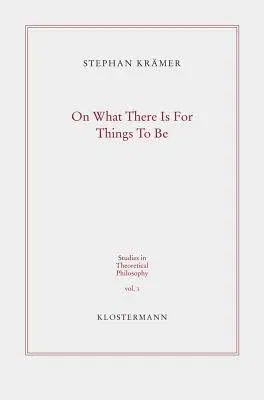Stephan Kramer
(Author)On What There Is for Things to Be: Ontological Commitment and Second-Order QuantificationPaperback, 1 September 2014

Qty
1
Turbo
Ships in 2 - 3 days
In Stock
Free Delivery
Cash on Delivery
15 Days
Free Returns
Secure Checkout

Part of Series
Studies in Theoretical Philosophy
Print Length
260 pages
Language
English
Publisher
Verlag Vittorio Klostermann
Date Published
1 Sep 2014
ISBN-10
3465038681
ISBN-13
9783465038689
Description
Product Details
Author:
Book Format:
Paperback
Country of Origin:
US
Date Published:
1 September 2014
ISBN-10:
3465038681
ISBN-13:
9783465038689
Language:
English
Location:
Frankfurt
Pages:
260
Publisher: